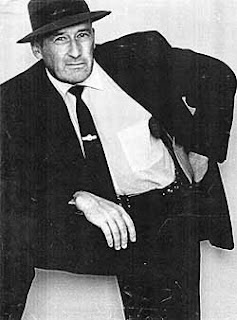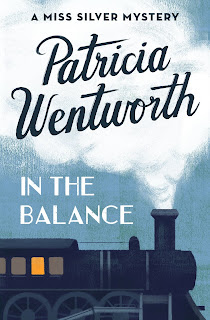We are told by those
presumably wiser than us that first impressions are hard to shake,
that they tend to sink their claws into the heart with an indelible
vengeance, refusing to let go despite the force of logic sprung from
overwhelming contrary evidence. All too disastrously often it
explains the expression “love at first sight” and, in voting
unimaginable authority and power to a stranger, “I liked the cut of
his jib.”
 |
| Wentworth |
In this vein I find myself
wondering how the course of my literary tastes might have progressed
had the first sentence of the first paperback my long-ago little self
plucked from the bookcase next to my father’s reading chair been
Miss Maud Silver looked along the crowded platform and felt
thankful that she herself was in a through carriage, instead of
The guy was dead as hell.
My father’s modest
collection of mysteries did include some by women. I remember seeing
the names Eberhart and Christie, but it was the Korean War and I
wanted to grow up to be a soldier and the only soldiers I knew were
men and with this tidal wave of serious manliness pounding against my
puerile sensibility is it any mystery Mike Hammer reached out and
took command? Miss Silver wouldn’t have stood a chance.
 |
| Spillane |
Today in my platoon she’d
have Hammer on the floor doing pushups while her knitting needles
clicked cadence. It’s quite possible that if the first sentence I’d
read back then had been from In
the Balance I might in later years have paid closer
attention in Latin and math, imagining those elderly ladies secretly
solving murders as a sideline.
I can’t say if Miss Bolte
was a knitter, but I can easily see her sitting in a train
compartment miles away from veni vidi vici, expertly working
her shiny steel needles through the purls and knits and slips of a
woolen jumper for her niece when her next client comes crashing
through the door babbling in a state of terror. The client, still
in shock after overhearing a conversation that seemed to indicate her
husband of six months was planning to kill her, confides in Miss
Bolte, trusting her in part because, frumpy and prim, she looks
and speaks like a retired governess. Miss Bolte certainly did fifty
years ago when I knew her, altho her teaching was in Midwest
classrooms filled with students, and she very likely never
entertained fearful newlyweds on trains bound for London, as did her
fictional counterpart, Miss Silver. And had she found herself in such
a circumstance, it is highly doubtful Miss Bolte’s perception would
have included a ratiocinating bent of the sort to observe of the
frightened damsel, “This is a London train. You would not be going
to London without any gloves if you had not come away in a hurry. And
they are not in your bag. That flat envelope shape would not close
upon a pair of gloves without bulging.”
To
herself, Silver notes that her compartment mate is “a normal
creature shocked into a temporary abnormality,” so
with the cat thus out of the first-appearance bag, Miss Silver
confirms her Sherlockian interest by handing the fellow passenger her
card when they disembark at the London station:
MISS MAUD SILVER Private
Investigations Undertaken. 15 Montague Mansions, West Leaham Street,
S.W.
At
this point we leave Miss Silver and follow Lisle Jerningham, the
young newlywed, to Tanfield, the massive estate that’s been in her
husband’s family half a millennium and has become such a money
hole the husband’s had to marry wealthy
wives
to keep from losing it
(oh, yes, Lisle Jerningham’s a rich American). The husband’s
first wife
died
when she fell off a cliff in a presumed accident, uh huh. Lisle finds
Tanfield an unwelcoming place, with her cold, controlling husband and
his two cousins, who are staying there as guests, regarding her
condescendingly as if watching a sacrificial lamb on the verge of
another Tanfield fatal accident. Indeed, Lisle narrowly escapes death
in two such accidents.
She
comes across as something of a ninny, naively giving her husband
the benefit of doubt after doubt, believing what they have between
them is
true love. She
even has a last will and testament drawn up leaving the bulk of her
estate to her husband. I found myself shouting a couple of times,
“You damned stupid IDIOT!!”
Lisle’s
creator, Patricia Wentworth, masterfully tortures us with Lisle’s
incrementally more insightful glimpses of the situation only to pull
her back into her thumb-sucking, trusting cocoon. Wentworth even lets
Lisle reach a point where she contacts Miss Silver and agrees to meet
her, but then changes her mind and cancels the appointment. STUPID!
STUPID! STUPID!...I shouted until the next-door neighbors began
banging on the wall. And then…
And then a minor character
wearing a fancy coat Lisle had given her moments before falls or
jumps or is pushed off a cliff to her death. Those with motive and
opportunity to push her include the husband and his cousins, all who
just happened to be in the vicinity at the time and who might have
noticed only the coat, not who was wearing it.
Enter
Miss Silver once again. She reads a newspaper account of the apparent
accident at Tanfield. She heads up to the nearest town. A former
student, Randal March, is the investigating officer:
It took
Randal
March
a long way back to a schoolroom
where a little inky boy and two much tidier little girls had absorbed
instruction in reading, writing, and arithmetic from a Miss Silver
who must in those days have been a good deal younger than she was
now, but who never seemed to him to have changed in any way with the
passage of years. Kind, dowdy, prim, intelligent—oh, very
intelligent—and firm.
She clues him in. He
appreciates her background and advice. Could he have caught on to the
truth without her? Do they save Lisle from yet a third attempt to
murder her? Are we happy with the ending?
I don’t
recall reading any other mystery novel where the narrative focus is
on the victim while the plot gathers like a boa constrictor around
the prey. I probably have read such novels, but the only story that
comes to mind is Dial
M for Murder,
the movie. I found In
the Balance
more gripping than the usual detective story, probably because I tend
to identify with the protagonist—in this case Lisle, albeit Miss
Silver’s supportive role is essential as, if nothing more, than a
savvy
accidental
ally.
In the
Balance
(originally Danger
Point)
is the fourth in her thirty-two-novel Miss Silver series. I very
likely will be reading others.
[For
more Friday's Forgotten Books check the links on Patti
Abbott's unforgettable blog]


This is perhaps the most persuasive review to get anyone not already familiar with Wentworth to read her books. I'm not a fan, sadly, and I've already read hundreds of books with similar plots in which the focus on a harried victim someone is desperate to do in. Peril at End House comes immediately to mind as one of the most iconic examples. I'm wondering if, as in that book, the murder attempts are all a trick engineered by the supposed victim. Also liked your amusing analogy between Miss Bolte from your past and Miss Silver. I've never had any teacher - female or male - who I'd dare to dream up a similar analogy though a handful of my teachers (from elementary school to college) were awe-inspiringly sharp-minded and have impressed still to this day.
ReplyDeleteWere Miss Bolte able to time-travel and read this she might well say something like "et tu Pauste, see me after class!!" Thanks for the kind words and the tips on other such mysteries. I'm pretty new with the classical stuff, plus I tend to forget plots within days of reading them.
DeleteI have only read two Miss Silver novels recently, Matt, although I read quite a few when I was younger. The two books I read recently were very good, so I will be reading more and I look forward to finding a copy of this one.
ReplyDeleteThis was the debut Miss Silver. I have a curiosity about first novels. My next one will probly be near the end of the series.
Delete